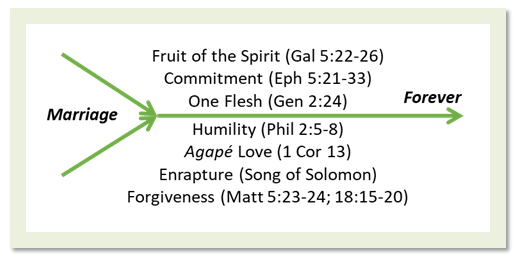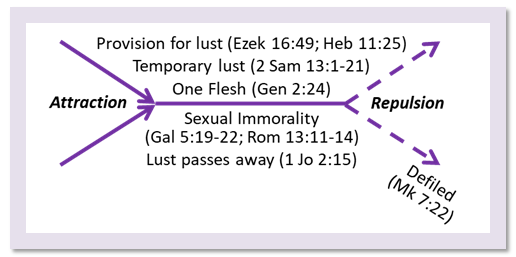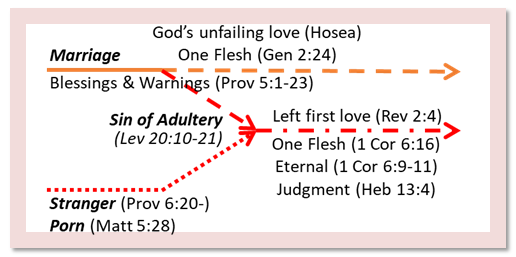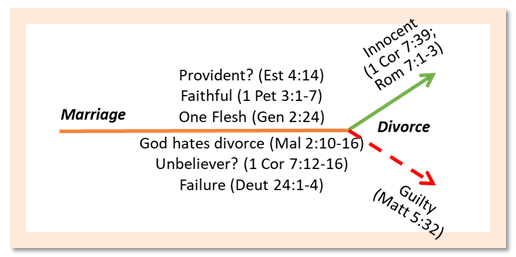This Biblical relationship checkup is designed to help couples in troubled relationships and dysfunctional relationships to discover what the Bible says about their relationship (2 Timothy 3:16-17). Armed with Biblical precepts, they can compare their relationship with Biblical concepts, and learn how God can restore their relationship (2 Corinthians 5:18).
This can be done by a couple without any help, but it is much more profitable to have a loving, concerned, godly helper guide them through the process (Galatians 6:1). Ideally, a trusted counselor, a respected older couple (Acts 18:26), or an older man (1 Timothy 2:12), with a proven, demonstrated, successful marriage (1 Timothy 5:22) should come alongside and disciple the couple (Acts 14:21).

Download biblical-relationship-matrix.pdf
Fold up a printout of the biblical-relationship-matrix in fourths, so only 1 panel is visible at a time, then walk them through the various relationships. It’s important to use Biblical language: godly, marriage, love, sin, immorality, depravity, stranger, adultery, abandonment, and divorce during the checkup. Do not use euphemisms and slang, such as: affair, lover, boyfriend, girlfriend, other woman, and separation. Remember, God’s law was given so that we can see how terrible sin really is (Romans 7:13).
or where you’re headed, you will never get anywhere.
Give each person a printout of the biblical-relationship-matrix and assign them each the homework of looking up these Bible verses and finding themselves and their relationship on this matrix. Ask them where they want their relationship to be in 5 years. It’s important for this homework to be done separately since part of the problem may be due to different perceptions of the relationship and different perceptions of the problems (Romans 14:12). It’s not unusual for one spouse to see things completely differently than the other. This checkup will usually provide enough background information to help with Biblical admonishment (Romans 15:14).
If they are not willing to invest the time and effort to go through this checkup and lookup these Bible verses, to find themselves on this matrix, and if they are not willing to do whatever it takes to restore the relationship, then there is no point in wasting time.
God’s plan of marriage

God instituted marriage in the Garden of Eden between the first man and the first woman. God said it is not good for man to live alone, so He made a helper who is just right for him (Genesis 2:18). This kind of Biblical marriage is intended to be between a Christian man and a Christian woman. It should be obvious that these Biblical precepts do not apply to other kinds of marriages.
- Swipe Right: The Life-and-Death Power of Sex and Romance by Levi Lusko
- His Needs, Her Needs: Building An Affair-Proof Marriage by Willard F. Jr. Harley
- Love Life for Every Married Couple (how to fall in love, stay in love, rekindle your love) by Ed Wheat
- If You’re in My Office, It’s Already Too Late: A Divorce Lawyer’s Guide to Staying Together by James J. Sexton
God intended the Christian marriage to be a permanent committed relationship built on Agapé love. This is the same love that caused God to send his only begotten son, Jesus Christ, to die for the sins of the world (John 3:16). It is a choice, based on a preference, not a romantic feeling. Please read Love Grows Where Love Flows for a comparison of these different kinds of love.
In Ephesians 5, Paul uses the marriage relationship as a metaphor to describe the headship of Jesus Christ to the church. He assumes they know about marriage. But, it is useful to look at this metaphor in reverse because a troubled marriage often needs to consider the situation from a different perspective.
God intended the Christian marriage to be a romantic love relationship. Read the Song of Solomon in a modern Contemporary English Version. It is beautiful, romantic, and erotic. Marriage was intended to be like that. If this checkup reveals your marriage does not measure up to that standard, God can help you fix problems even this complicated. Also read Help for Hurting Marriages.
And, most importantly, a Godly committed lasting marriage is built on forgiveness. No matter what, we are sinners (1 Timothy 1:15), so we will sin and we will hurt one another. If this checkup reveals your relationship is damaged, the only way to restore it is to confess, repent, forsake, and forgive (1 John 1:9). Also read 7 Characteristics of a Real, Genuine, Sincere Apology and 101 verses on forgiveness and forgiving
Satan’s perverted depravity

What God creates; Satan tries to destroy (John 10:10). He has perverted God’s perfect plan of marriage into an awful depravity. It is always based on the lust of the flesh, the lust of the eyes, and the pride of life (1 John 2:16). This is the same temptation that Satan used on Eve in the Garden of Eden (Genesis 3). It is the same temptation Satan used on Jesus Christ in the wilderness (Matthew 4).
This kind of relationship is always temporary because the lust of the world passes away. It is based on physical attraction leading to immorality and always ends in repulsion. Read the account of Amnon and Tamar (2 Samuel 13) for a typical example of this kind of relationship. God doesn’t sugar coat this awful sin with euphemisms, and neither should we. This kind of relationship always defiles both people. It damages their inner being (Mark 7). This is true of a flesh and blood man or woman, a robot sex doll, virtual pornographic sex, or written erotica (Matthew 5:28).
This kind of relationship goes against the conscience of any Christian. It causes lasting permanent damage. This stress, anxiety, and depression can lead to self-harm and suicidal thoughts. If you have found yourself in this place, there is hope because Jesus Christ can resolve problems even this complicated.
- 8 Truths About the Conscience
- Help for suffering from stress, anxiety, and depression
- 7 reasons for hope instead of suicide
If this checkup finds you in the sin of depravity, thank God that you can confess, repent, forsake, and be forgiven (1 John 1:9) and washed from your unrighteousness (1 Corinthians 6:11). Part of repent and forsake is to change your behavior so you won’t fall back into this sin again. Stop hanging out with people who are dragging you down. Stop doing the things that are tempting you. Start finding godly friends who can encourage you and hold you accountable. Start finding wholesome things to do that will keep you away from the temptations.
The sin of adultery

Solomon spent 2 chapters in the beginning of Proverbs to warn against adultery. Avoid immoral women (Proverbs 5). Lessons for daily life (Proverbs 6). If you blow past all these warnings, and your own conscience, and the guiding of the Holy Spirit, and the leading of Jesus Christ in your life, and the good example of godly friends and family, then you are so stupid that you deserve to be burned (Proverbs 6:27). The sin of adultery is so awful that God commanded both the adulterer and the adulteress to be put to death (Leviticus 20:10-21).
Adultery is the worst kind of sexual immorality because it brings another “one flesh” relationship into the marriage. This is true of a flesh and blood man or woman, a robot sex doll, or virtual pornographic sex (Matthew 5:28). Let’s be clear, God says these kinds of people cannot inherit the Kingdom of God (1 Corinthians 6:10). If you stay in this condition, God will judge you, and it won’t end well.
- The Most Effective Way To Destroy Your Husband, Ruin Your Marriage, And Encourage Infidelity
- How To Betray Your Wife, Destroy Her Self-Worth, And Implode Your Marriage In One Easy Step
- How to ruin your reputation (3 fast easy ways)
- 10 Ways Prayers are Hindered (#5 is Shocking)
- 7 Characteristics of a Real, Genuine, Sincere Apology
- 7 ways to restore the joy of your salvation
- Help for hurting marriages
Adultery is bad enough by itself, but the lasting effects are even worse. The lying and cheating can become so common as to be second nature. The stress and anxiety of guilt can be debilitating. The loss of trust can be permanent. The lack of forgiveness can cause even more damage. There have probably been more violence and murder committed because of adultery than any other sin.
If this checkup finds you in the sin of adultery, you can confess, repent, forsake, and be forgiven (1 John 1:9) and washed from your unrighteousness (1 Corinthians 6:11). Part of “repent” and “forsake” requires the adulterer to consider the adulteress to be physically dead and emotionally separated. Remember, the adulteress relationship is another “one flesh” just like the marriage relationship (Genesis 2:24 and 1 Corinthians 6:16). Therefore, the adultery must be ended with serious finality and formality appropriate for the situation. I recommend the adulterer makes deep and painful changes to prevent any ongoing relationship. This might mean changing jobs, moving to a different city, or changing habits and hobbies. I know this is painful, but it is part of the reaping from this awful sin (Galatians 6:7).
God’s allowance of divorce

Divorce can be a difficult subject because God didn’t intend for marriage to end in divorce (Matthew 19:8). The Bible does everything it can to preserve the permanent commitment of marriage (Mark 10) because God hates divorce (Malachi 2:10-16). Divorce is only allowed due to sin. Sometimes there is a guilty perpetrator and an innocent victim, and sometimes both parties are at fault (Leviticus 20:10-21). Be very careful of your checkup. Have someone else double-check you.
We are without excuse because God provides the strength to obey his will. His power is made perfect in weakness (2 Corinthians 12:9). He will strengthen you with power through His Spirit in your inner being (Ephesians 3:16). You can do all things through Christ (Philippians 4:13). You are being strengthened with all power according to His glorious might (Colossians 1:11). You can thank Christ Jesus our Lord, who has strengthened you (1 Timothy 1:12).
- Help for hurting marriages
- 12 words guaranteed to save your marriage
- 8 words guaranteed to fix your life
- Love Grows Where Love Flows (the secret to a loving romantic marriage)
But God also provides a way of escape for the innocent victim when things are too awful to bear. This is like the provision God made for slaves to be set free if their masters abused them (Exodus 21). God protects spouses as much as he protects slaves. If this checkup finds you ready for divorce, please read:
- The Divorce Dilemma: God’s Last Word on Lasting Commitment by John MacArther (Review)
- How to Save Your Marriage Alone by M.D. Ed Wheat
- Hope For the Separated: Wounded Marriages Can Be Healed by Gary Chapman
- If You’re in My Office, It’s Already Too Late: A Divorce Lawyer’s Guide to Staying Together by James J. Sexton
Tucker Carlson: Elizabeth Warren encouraged married, two-parent families 16 years ago. She can’t do that today
The Two-Income Trap: Why Middle-Class Mothers and Fathers Are Going Broke
“A generation ago, a single breadwinner who worked diligently and spent carefully could assure his family a comfortable position in the middle class. But the frenzied bidding wars, fueled by families with two incomes, changed the game for single-income families as well, pushing them down the economic ladder. To keep Mom at home, the average single-income family must forfeit decent public schools and preschools, health insurance, and college degrees, leaving themselves and their children with a tenuous hold on their middle-class dreams. Such pressures have taken these women out of the home and away from their children and simultaneously made family life less, not more, financially secure. Today’s middle-class mother is trapped: She can’t afford to work, and she can’t afford not to.”
Breaking Up is Hard to Do, Unless Everyone Else is Doing it Too — Divorce represents the dissolution of a social tie, but it is also possible that attitudes about divorce flow across social ties. To explore how social networks influence divorce and vice versa, we exploit a longitudinal data set from the long-running Framingham Heart Study. The results suggest that divorce can spread between friends. Clusters of divorces extend to two degrees of separation in the network. Popular people are less likely to get divorced, divorcees have denser social networks, and they are much more likely to remarry other divorcees. Interestingly, the presence of children does not influence the likelihood of divorce, but each child reduces the susceptibility to being influenced by peers who get divorced. Overall, the results suggest that attending to the health of one’s friends’ marriages may serve to support and enhance the durability of one’s own relationship, and that, from a policy perspective, divorce should be understood as a collective phenomenon that extends beyond those directly affected.